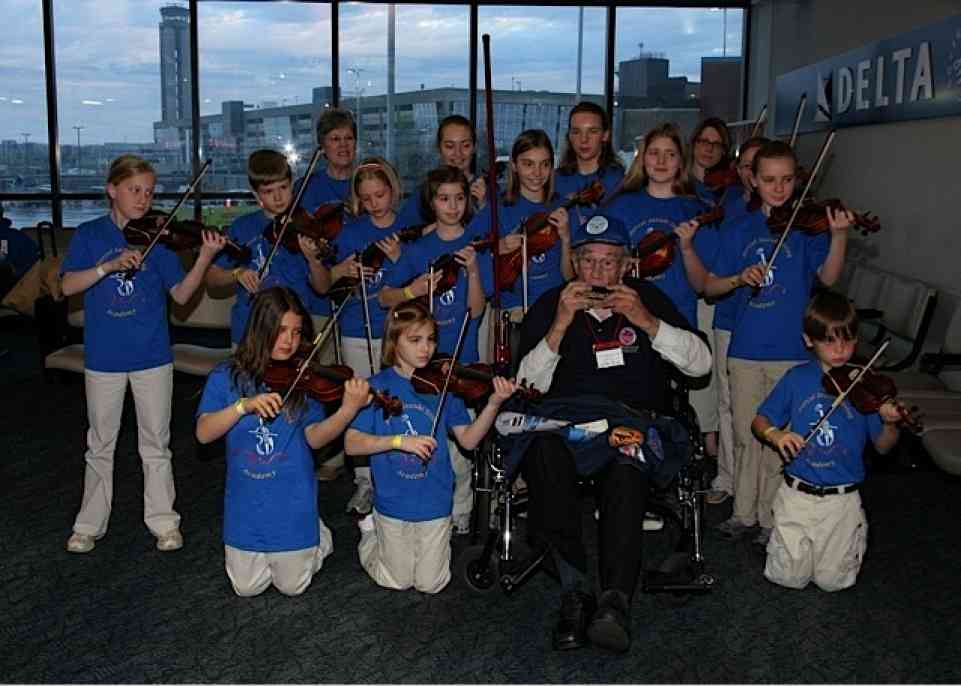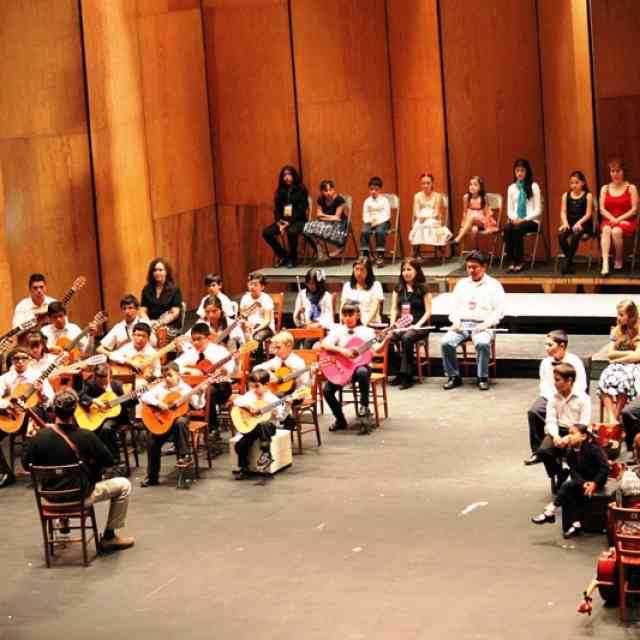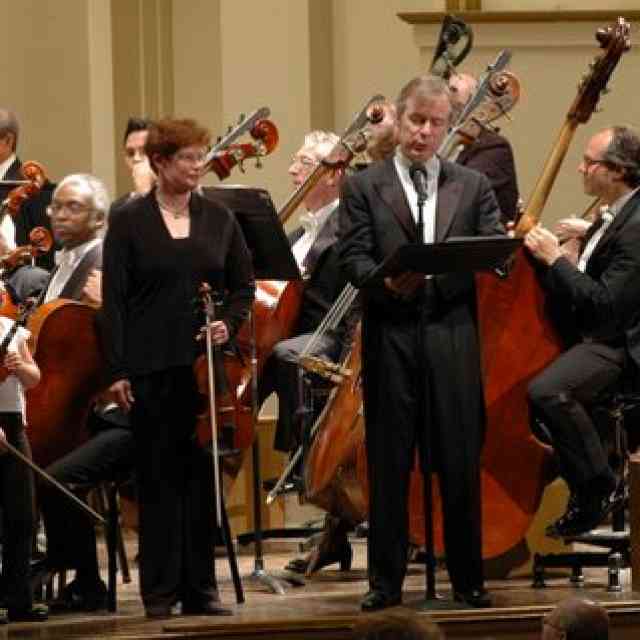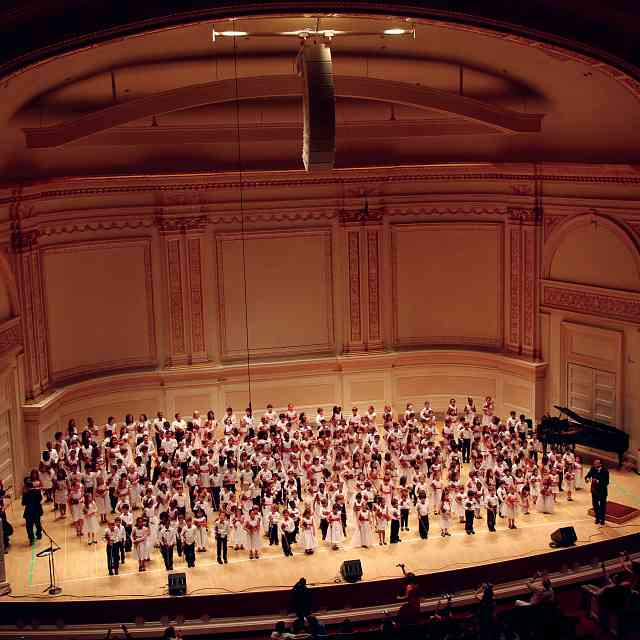Pablo Casals, the world famous cellist, once said, “Perhaps it is music that will save the world.” The students of the Barcel Suzuki String Academy, located in the suburbs of Milwaukee, Wisconsin, are learning the impact music has on the heroes of a past generation: World War II veterans who really did save the world.
As believers in Dr. Shinichi Suzuki’s philosophy to nurture the whole child, it is important to instill in our students a sense of gratitude for the freedoms they have now as well as for the sacrifices that were made years ago. The BSSA faculty and families have had a unique opportunity to learn these lessons of gratitude and service through our experiences with the Stars and Stripes Wisconsin chapter of the Honor Flight. With our minor sacrifices of arriving at the airport at 4 a.m., playing our violins for two hours, and extending practice times to learn new repertoire, we are learning the bigger meaning of gratitude, growing beautiful hearts and seeing the immediate impact of creating music for others.
—Colleen Fitzgerald, Executive Director of the Barcel Suzuki String Academy

Students perform with veteran Walter Roob
It’s 4:30 a.m. at Mitchell International Airport in Milwaukee, Wisconsin. Before dawn breaks, the terminal is packed. There are hundreds of people helping some two hundred elderly passengers (all are in their 80s and 90s) slowly make their way through airport security to the departing gate; some are walking, others are in wheelchairs. The process is slow, but no one is rushed or impatient as you might expect from an airport crowd. In fact, these travelers even stop to hear the music—the music of young violin students filling the terminal with patriotic songs.
The violinists are members of the Barcel Suzuki String Academy. The elderly passengers are veterans of World War II who are arriving at the airport before the crack of dawn to board their Honor Flight. Two chartered Boeing 757 airplanes will take the veterans and their guardians on a one-day trip to Washington, DC, to see the memorials that stand in their honor. The violinists were invited by the local Honor Flight chapter to send these veterans off in style.
The Honor Flight program is a wonderful story of communities coming together—just in time—to honor the Greatest Generation. Honor Flight is a national network with 123 hubs from coast to coast. Each hub is run by volunteers who raise their own funds to fly WWII veterans from their area to see their memorial in Washington. While WWII was one of this nation’s largest conflicts in terms of scope and casualties, the memorial dedicated to this defining event of the twentieth century was not built until sixty years later. Despite a four-day dedication ceremony over Memorial Day weekend in May 2004, the majority of these now elderly veterans never had chance to see the memorial honoring their service. Most WWII veterans do not have the means—either physically or financially—to make the pilgrimage to Washington, DC. In fact, of the 16 million who served, only 1.5 million are still with us. According to the US Department of Veterans Affairs, almost nine hundred WWII veterans die every day.
Many people have the image of the WWII veterans being celebrated, as in the famous Times Square photo of the sailor kissing a nurse in the midst of falling confetti on V-J Day. The reality of these soldiers’ homecomings, however, was quite different. Most WWII veterans will tell you they came back from the war, threw their duffle bag in the hall and never talked about it again. In their minds, they didn’t want to burden their families with the horrors of war. They also didn’t think what they did was particularly special. They just answered the call to serve, like so many other Americans.
Enter Honor Flight. The idea started with Earl Morse, a physician’s assistant at a VA medical facility in Ohio, who wanted his WWII veteran patients to see their memorial. When he realized none of them thought a trip to Washington, DC, was possible for them, Morse made an offer to one of his patients that surprised even him. “Why don’t you let me fly you to Washington,” said Morse, who was also a private pilot, to his patient. So Morse got a dozen other pilots from his local flying club together to make the trip. The only catch was the pilots would foot the bill—the WWII veterans would not spend a dime on this trip. So with that, the pilots and their precious cargo of two dozen WWII veterans left for a day trip to Washington. Morse says once he saw the veterans’ reaction to their memorial, he was hooked. Morse came back from that trip determined to make the same experience happen for more veterans. Today, more than 125,000 WWII veterans have taken an Honor Flight.
In Milwaukee, the local Honor Flight hub is called Stars and Stripes Honor Flight. It’s a very successful hub that has raised more than $1.5 million to take eighteen flights hosting more than 2,500 veterans. Part of the secret to its success is the support of the Milwaukee community. The people of southeastern Wisconsin have embraced the Honor Flight mission with all their heart and soul. I have seen this first hand as a member of the Stars and Stripes Honor Flight board of directors and a parent of two Barcel Suzuki String Academy students.
“I love to get up at 3 a.m. to play for the veterans,” my eleven-year-old daughter said after performing at her second Honor Flight send-off. If there was any doubt that we could motivate a couple dozen children to wake up in the middle of the night to go to the airport and play their violins for two hours straight, it was quashed after our first Honor Flight performance in May of 2010. Our Barcel teacher, Barbara Schaefer, worked up a playlist that included a few songs from the Suzuki repertoire, but mostly included new songs for the students to learn featuring all the traditional patriotic songs and service medleys. Mrs. Schaefer told the children, “Our goal is to provide a joyful experience to each veteran.” Little did we know just how much joy the children would truly bring.
The students got to the airport by 4 a.m. so they would have time to go through security. We submitted all of our names and dates of birth beforehand, but the students needed to bring some form of picture ID (not always easy for an elementary student) in order to get the special TSA security clearance to go to the gate without a ticket. Honor Flight is an amazing operation of a couple hundred volunteers greeting veterans, pushing wheelchairs, helping the elderly travelers through security. The airport was abuzz with color guards and active military, all on hand to greet and thank the veterans who forged the path for them. Our violin group felt like we were part of a well-oiled “Thank You” machine.
We set up to play next to the departing gate and the young violinists were the first thing the veterans heard and saw as they approached the waiting area. As you might imagine, boarding a large aircraft loaded with passengers in wheelchairs does not happen quickly. The live music is a welcome distraction to the lengthy boarding process. But it’s more than an entertaining diversion for these veterans. It’s also their first glimpse of the day to come—a day that is so much more than a sightseeing trip to Washington, DC. This day is about expressing gratitude and saying thank you.
The violinists knew they won over their crowd when on our first flight, one of the veterans whipped out his harmonica and started playing with our students. The music seemed to take eighty-seven-year-old Walter Roob back to that eighteen-year-old man who went off to war, playing his harmonica. Roob served as a photographer in the United States Army Air Corps in Europe. He served for the last two years of the war and compared his Honor Flight with the thrill of coming home from war all over again.
“Holy cats God. You got us back and we’re still alive. What a feeling to be alive,” he said as tears welled up in his eyes.
Roob wore his emotion on his sleeve as he joyfully jumped in with the Barcel students, playing his harmonica from his wheelchair, surrounded by young violinists who were surprised, yet delighted, by their impromptu guest performer.
The Barcel Suzuki String Academy kept in contact with Mr. Roob, inviting him to our Festival Concert where the veterans were once again honored. Since his Honor Flight, Roob suffered a massive stroke, but his face still lit up at the sight and sounds of the violinists. He said, “I was thrilled and honored to play with such talented children. It was like joy to the world hearing them play. I was proud to have met them and enjoyed watching them play.”
It was an admiration that went both ways. As Suzuki parents, we stood in the terminal with one ear to our children’s music, but our eyes firmly planted on the veterans’ faces. We saw veterans tear up after listening to the children play. Some even had to be pushed away in their wheelchairs when the emotions came on too strong. Through it all, the children kept playing. The gift of music was seeded in their hearts along with the tremendous gratitude that would color their entire day.
I received this email from one of my fellow Suzuki parents after our children performed for an Honor Flight.
I know I’m speaking for all the kids, teachersand parents who were at the airport yesterday morning: THANK YOU so much for giving our kids the opportunity to do this!
It was so rewarding, touching and simply an honor to add our little violin program to this amazing event.
We were so touched by this great “Honor Flight”that my husband and I actually went back to the airport last night to greet the veterans when they came back home, even though we didn’t know anyone really.
We could not have imagined the crowd of thousands of people and the spirit of appreciation for what these veterans did so many years ago. I have never seen anything like it!
There was an about fourteen-year-old boy standing near us, who would try to shake as many hands of veterans as possible and thank them personally.
Many of the veterans were crying when they saw this great reception. They were overwhelmedand clearly didn’t expect anything like this. They will never forget this day!
Walter Roob, our friend with the harmonica, was sobbing when he was wheeleddown the aisle. Then he stopped, took out his cell phone and videotaped the crowd! We heard that he played his harmonica all day long and kissed all the girls he could find. He had a blast.
Once the veterans were all boarded on their airplanes, our job as the morning entertainment was done, but the veterans’ day was just beginning. Their Honor Flight takes them on a whirlwind sixteen-hour day and the surprises keep coming.
Before takeoff in Milwaukee, their planes are given a water cannon salute, a thrilling display when fire trucks come to the tarmac and spray an arch of water at the airplane as it taxis towards takeoff. Then, once the plane lands in Washington, DC, the veterans are greeted by crowds of total strangers cheering for these veterans like they are their own grandparents.
And so it goes throughout the day in Washington. Visitors to the spectacular WWII Memorial, which rests between the shadow of the Washington Monument and the Lincoln Memorial, are treated almost daily to groups of Honor Flight veterans. The veterans can barely go five feet without someone wanting to come up to them and shake their hand and say “Thank you for your service.” Americans have gotten much better about recognizing and honoring the sacrifices of our veterans since 9/11, but for these WWII veterans this trip can be their first official thank you. Perhaps that is because many veterans never talked about their service. Many family members have told us they never heard details of their loved ones service in WWII until their Honor Flight experience gave them permission to open up.
After a long day touring the war memorials and visiting Arlington National Cemetery where the veterans see the Changing of the Guard at the Tomb of the Unknown Soldier, the already emotional day climbs to a new level. As the plane flies back to Milwaukee, each and every veteran is given a packet of mail from home in a good old fashioned “Mail Call” just like they had during WWII. Of course, letters from home were the only form of communication back then, so Honor Flight recreates that experience. The letters are secretly gathered by family and friends and given to Honor Flight volunteers for the veteran’s personalized mail call packets. We’ve had veterans tell us that they didn’t realize their family still loved them until they opened that packet of mail.
As if that were not enough, the real fun begins when the veterans deplane back in Milwaukee. They have no idea of the crowd that has gathered at the airport to greet each Honor Flight when it returns—sometimes very late at night. Crowds of 6,000 people and more wait for hours to line a makeshift parade route through Milwaukee’s airport. Bagpipers, marching bands, cheerleaders, uniformed active duty military all come out to welcome the veterans home. Families go all out for their veterans, wearing matching t-shirts or holding banners and poster-sized service era pictures of their loved ones. It’s a history lesson and a love story all wrapped into one amazing present. When the veterans step off the plane into the arms of the adoring crowds there isn’t a dry eye in the house. I have seen flight attendants get off the plane to take a peek at the crowd, and they come back to the plane in tears. The Homecoming crowd is simply a sight to behold and the veterans cannot believe that all these people are there for them. It will take almost two hours for all the veterans to make their way through the airport terminal into the arms of their cheering family. The crowd will be just as enthusiastic for the last veteran as it is for the first. No one leaves until all the veterans have had their walk down the parade route. It is a homecoming they have never had. A final thank you, more than seventy years late—but just in time.
The Barcel students have had the privilege of performing at many more Honor Flight send offs since that first one in 2010. The same core group of performers comes back time after time—despite that crazy, early wake up call—to play for the veterans. With each flight, the students learn another song from the WWII era, like “Hello Ma Baby” or “You are My Sunshine.” And each new flight brings more smiles and more tears. We also had the unique experience of performing for the veterans at Miller Park (home of the Milwaukee Brewers baseball team) last summer. The event was called Field of Honor: A Salute to the Greatest Generation. More than 30,000 people filled the stadium in tribute to these veterans. It was a chance to salute all WWII veterans, especially those too frail to undertake the long day of an Honor Flight. The event featured the world premiere of the documentary film Honor Flight, which chronicles the story of Stars and Stripes Honor Flight and the community that came together to make the experience possible. If you get a chance to see the film, you’ll catch a glimpse of our violin students playing for the veterans during one of those early morning send-offs. A brief moment caught on film, but an experience that will shape our violin students for the rest of their lives. Honor Flight taught them that music is a gift best shared, and it can say Thank You in a way more powerful than any words.
For more information on an Honor Flight hub near you, visit www.honorflight.org
To find out where to see the documentary film Honor Flight, visit https://streamingmoviesright.com/us/movie/honor-flight/
To see more pictures of the students playing for Honor Flight, visit the Barcel Suzuki String Academy website at www.barcelsuzuki.com








